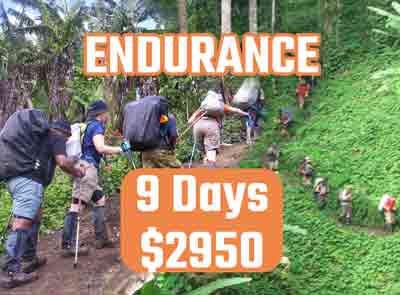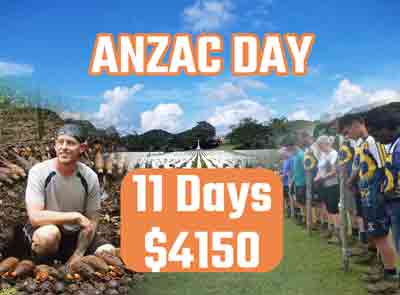Ultimate Meal Plan: Hiking Meal Plans For Food Ideas on the Kokoda Trail
Introduction
Embarking on the Kokoda Track is an adventure of a lifetime, offering trekkers the opportunity to immerse themselves in the rich wartime history of Papua New Guinea. As you prepare for this challenging trek, it’s crucial to plan your hiking meal strategy meticulously to ensure you have the energy needed for the journey. This comprehensive guide will walk you through the best meal plans for your Kokoda Trail trek.
Understanding the Basics
Calories Per Day
One of the most critical aspects of your hiking meal plan is ensuring you consume an adequate number of calories per day. A multi-day hike demands sustained energy, so calculate the right amount of food to keep you going. Aim for a balance that provides enough calories to fuel your body without overloading your backpack.
Types of Food
Consider a mix of lightweight and nutritious options for your backpacking food. Dehydrated meals, freeze-dried meals, and trail mix are popular choices. Don’t forget staples like tuna, dried fruit, peanut butter, and beef jerky to add variety and essential nutrients to your diet.
Meal Preparation
Plan your meals with careful consideration of the terrain and your hiking schedule. Opt for dehydrated backpacking meals that only require boiling water for preparation. This not only saves weight but also simplifies the cooking process, especially after a long day on the trail.
Crafting Your Meal Plan
Breakfasts to Start the Day Right
Begin your day with energy-boosting breakfasts. Consider dehydrated backpacking breakfasts, granola with dried fruit, or instant oatmeal. These options are quick to prepare and provide the necessary fuel for the day ahead.
Snacks Throughout the Day
Maintaining a steady intake of calories throughout the day is crucial for sustaining energy levels. Pack a variety of snacks like trail mix, energy bars, and dried fruit to munch on during breaks. This ensures you stay fuelled during the entirety of your hike.
Lunch on the Trail
Opt for lightweight and easily accessible lunch options. Dehydrated meals, wraps with tuna or peanut butter, and energy-boosting snacks are ideal for refueling without slowing you down.
Dinner at the Campsite
As you wind down at the end of a long day, a hearty dinner is essential. Dehydrated backpacking dinners are convenient and require minimal effort to prepare. Ensure your dinner is rich in carbohydrates and protein to aid recovery and prepare you for the next day’s challenges.
Meal Planning Tips
Consider Your Energy Needs
Tailor your meal plan based on the intensity of your hiking day. A long hike may require more calories, so adjust your food intake accordingly. Listen to your body and adapt your meal plan as needed.
Backpacking Recipes for Variety
To prevent meal fatigue, incorporate a variety of backpacking recipes into your plan. Experiment with different dehydrated meals, try vegan backpacking food options, and discover what works best for you.
Efficient Food Storage
Organize your food bag efficiently to access items easily during breaks. Pack items in a way that distributes weight evenly and keeps your food secure. Consider using Sea to Summit or similar lightweight storage solutions for added convenience.
Hydration Matters
Remember to include enough water in your meal plan. Staying hydrated is vital for overall performance and endurance, especially during a challenging trek like the Kokoda Trail.
Conclusion
Crafting a comprehensive hiking meal plan is essential for a successful Kokoda Track adventure. By carefully considering your energy needs, choosing the right types of food, and planning your meals efficiently, you’ll be well-prepared for the physical demands of the trail. As you embark on your journey, relish the breathtaking landscapes and historical significance of the Kokoda Track while staying fuelled and energized throughout your trek. Safe travels!
FAQ’s
Q: What are some essential considerations when planning a hiking meal plan?
A: When planning a hiking meal plan, it’s important to consider the duration of the hike, the nutritional needs of the hikers, weight and portability of the food, as well as the cooking equipment and facilities available during the hike.
Q: How can I best prepare for a multi-day backpacking trip in terms of food?
A: To prepare for a multi-day backpacking trip, you should carefully plan each meal and snack, considering the calorie and nutritional requirements for the duration of the trip. It’s also important to pack lightweight, high-energy foods that are easy to prepare and won’t spoil easily.
Q: What are some popular food ideas for backpacking?
A: Popular food ideas for backpacking include dehydrated meals, trail mix, energy bars, nuts and seeds, dried fruits, instant oatmeal, and freeze-dried meals. These foods are lightweight, easy to prepare, and provide essential nutrients and energy for hikers.
Q: How can I ensure that I’m packing the right amount of food for a backpacking trip?
A: To ensure you pack the right amount of food for a backpacking trip, consider the number of days you’ll be hiking, the distance and difficulty of the trail, your individual calorie needs, and any extra food you may want for emergencies or unexpected circumstances.
Q: What are some best backpacking meal tips for a long hiking trip?
A: Some best backpacking meal tips for a long hiking trip include packing lightweight, high-calorie foods, planning a variety of meals to avoid taste fatigue, pre-packaging ingredients to save space and weight, and minimizing food waste by repackaging in resealable containers.
Q: How should I approach meal planning for a backpacking trip?
A: When approaching meal planning for a backpacking trip, consider the nutritional content of each meal, the weight and volume of the food, and the cooking method required. It’s important to plan meals that are balanced, easy to prepare, and will provide sustained energy for hiking.
Q: What are some good backpacking food ideas for breakfasts on the trail?
A: Good backpacking food ideas for breakfasts on the trail include instant oatmeal, granola with powdered milk, breakfast bars, and lightweight pre-packaged breakfast meals. These options are quick to prepare and offer a good balance of carbohydrates, protein, and fats.
Q: How can I ensure that I’m carrying enough food for a hiking trip?
A: To ensure you’re carrying enough food for a hiking trip, calculate the food per person per day based on individual calorie needs, account for additional calories burned during the hike, and consider the weight and bulk of the food to be carried. It’s better to have a little extra than not enough.
Q: What are some simple food ideas for dinners while backpacking?
A: Simple food ideas for dinners while backpacking include dehydrated pasta or rice dishes, instant soups, couscous mixes, and freeze-dried meals. These options are convenient, lightweight, and provide a warm and satisfying meal at the end of a hiking day.
Q: How can I make a detailed meal plan for a hiking trip?
A: To make a detailed meal plan for a hiking trip, calculate the daily calorie needs for each hiker, plan a variety of meals and snacks to meet nutritional requirements, and create a shopping list with the necessary ingredients. Ensure the meals are easy to prepare and suitable for the outdoor environment.




